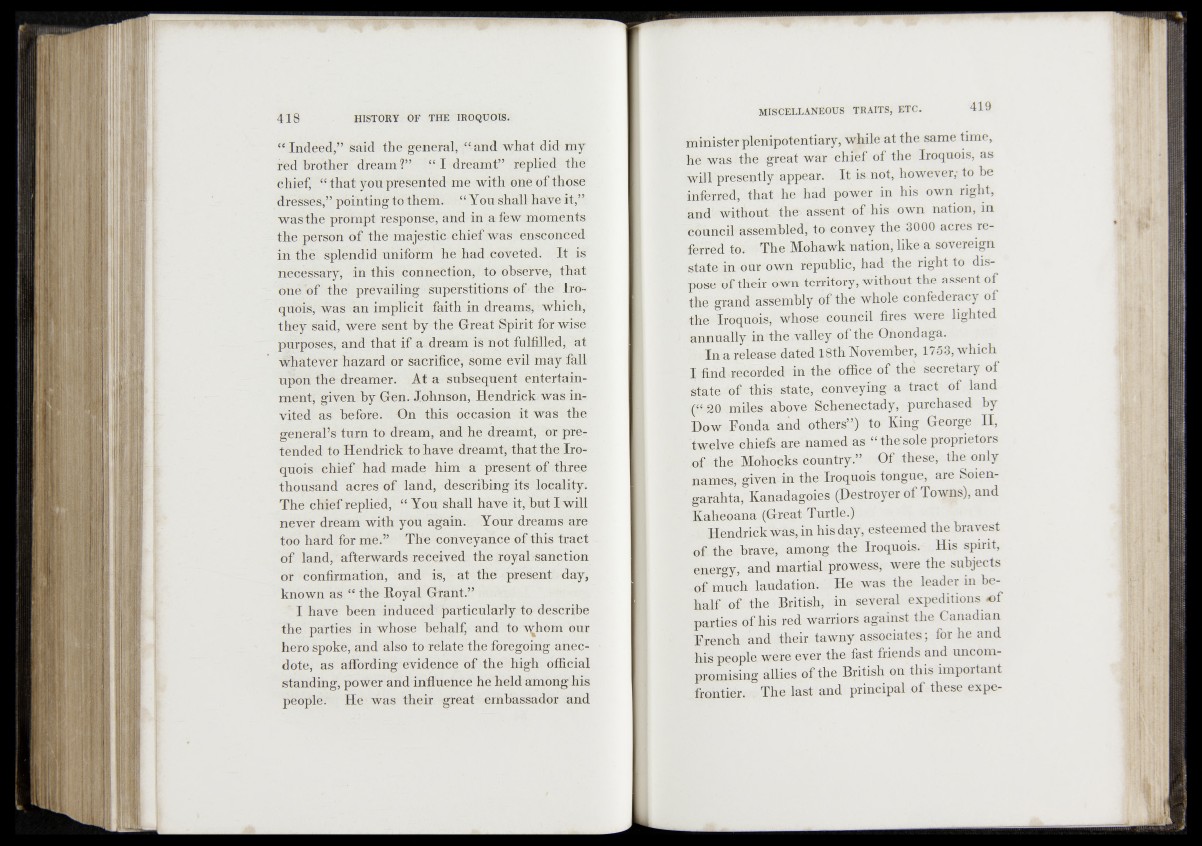
“ Indeed,” said the general, “mnd.what did my
red brother dream ?” 11 dreamt” replied; the
chief} “ that you presented' me with one of those
dressés}’; pointing to them. ^“You shall have it-,?’
was the prompt response, and in a fh w moments
the person of the majestic-chief was ensconced
in the- splendid uniform he had.coveted. It is
necessary, in this ‘ connection, to observe-, that
oné of the prevailing superstitions of the Iroquois,
was an implicit faith in dreams, which,
they Said,' were sent by the Great Spirit for wise
purposes, and that if a dream is not fulfilled; at
whatever hazard or Sacrifice*, sotne évil may fall
upon the dreamer: At a subsequent entertainment;
given by Gen. Johnson, Hendrick was invited
as- before; On this Toccasion ft-was the
general’s turn to dream, and he dreamt, Or pretended
to Hendrick to have dreamt/that the Iroquois
chief had made* him a present of three
thousand acjes of laiid, describing its locality.
The chief replied, “ Youshall have it, but I will
never dream with you again. Your dreams are
too hard for mê,”‘ f The conveyance of this tract
of land, afterwards received the royal sanction
or confirmation, and is, at the present day,
known as “ the Royal Grant.’’ ;
I have been induced particularly to describe
the parties in whose behalf, and to \^hom our
hero spoke, and also to relate the foregoing anecdote,
as affording evidence of the high official
standing, power and influence he held among his
people. He was their great embassador and
MISCELLANEOUS TRAITS, ETC. 419
minister plenipotentiary, while at the same time,
he was the great war chief of the Iroquois, as
will presently appear. It is not, however; to be
inferred, that, he had power in his own right,
and without,: the> assent of his own nation, in
council assembled, to convey the 3000 acres referred
to. The Mohawk nation, like a sovereign
state in our own republic, had the right to dispose
of their own territory, without the assent of
the grand assembly of the whole confederacy of
fhe Iroquois* whose council fires were lighted
annually in the valley of the Onondaga.
In a release dated 18th November, 1753, which
I find-recorded in the office of the secretary of
state of this state, conveying a tract of land
(J&20, .miles above Schenectady, purchased by
Dow Fonda and others”) to King George II,
twelve chiefs ,are named as “ the sole proprietors
of the Mohoqks country.” Of these, the only
names, given in the Iroquois tongue, are Soien-
garahta, Kanadagoies (Destroyer of Towns), and
Kaheoana (Great Turtle.)
Hendrick was, in his day, esteemed the bravest
of the brave, among the Iroquois. His spirit,
energy, and martial, prowess, were the subjects
of much laudation; He was the leader in behalf
of the British, in several expeditions «of
parties of his red warriors against the Canadian
French and their tawny associates; for he and
his people were ever the fast friends and uncompromising
allies of the British on this important
frontier. , The last and principal of these expe